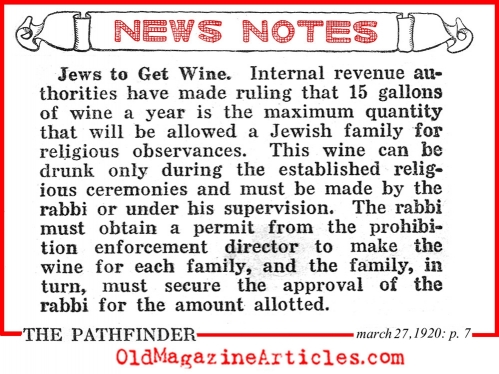Seven years after wine and spirits were banished from the land, the government in Washington felt pressured to discipline all those restaurateurs who failed to defenestrate their patrons who brought illicit drink into their establishments. This is an article about how an attempt was made to get restaurant owners to police their customers. In 1917 Washington, D.C. had no mayor, no city council and no say as to the goings on in Congress - the city was lorded over by the President and a Congressional commission. It was set up that way by the founders - and that is how Prohibition came to Washington, D.C. two years earlier than the rest of the nation: with the flick of his wrist, President Wilson signed the Sheppard Bill, legislation that declared that after November 1, 1918 all alcohol would be prohibited in the District of Columbia. A 1922 magazine article concerning the dangers of black market liquor in the United States during the Prohibition period (1919 - 1933): "When you drink bootleg the chances are better than nine out of ten that you are drinking rank poison." "This is not the statement issued either by Prohibitionists to discourage drinking, or by a Anti-Prohibitionist to show what Prohibition has brought us to. It is the conclusion of a large newspaper service, which had it's men in various parts of the country buy the 'ordinary mine-run of bootleg liquor', and then had the samples analyzed to get an idea of what a man's chances are of getting poisonous booze." Click here to read about President Woodrow Wilson and his wish to re-write the post-war Prohibition restrictions.  |
Here is an interview with Izzy Einstein (Isidor Einstein, 1880 – 1938): Prohibition agent and master of disguise:
"A day with Izzy would make a chameleon blush for lack of variation..."
"He prepared himself to move in high, low and medium circles - on the excellent theory that the taste for liquor and the desire to sell it are no respecters of persons - and in all those circles he has since been whirling with rapidity and a quick-change adeptness."
Since the earliest days of World War I, the European combatant nations made some adjustments in regard to the sale of alcohol and the hours in which pubs could operate. When the U.S. entered the war in April of 1917, Congress decided that they had better do the same - but they were far more harsh on the topic - closing bars entirely and outlawing all wines and spirits - except for their use in religious sacraments. In the attached article journalist gathered data from various newspapers that were located in states that were already dry in order to study how the experiment was proceeding. Seeing that much of the momentum to prohibit the national sale, distribution and consumption of wine and spirits originated with a hardy chunk of the observant Christian community, the Reverend John Cole McKim decided to weigh in on the topic. McKim tended to believe that: "Christ, being divine and consequently infallible, could not have erred. Since it is well known that Christ used wine Himself and gave it to others..." He further opined: "But to vote what one regards as a natural right shall be declared forever illegal, is cowardly, un-American, and un-Christian." |